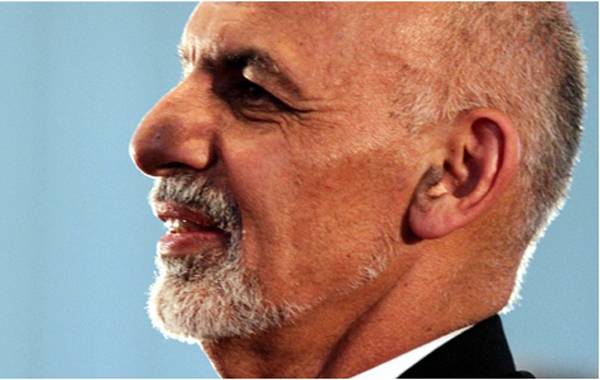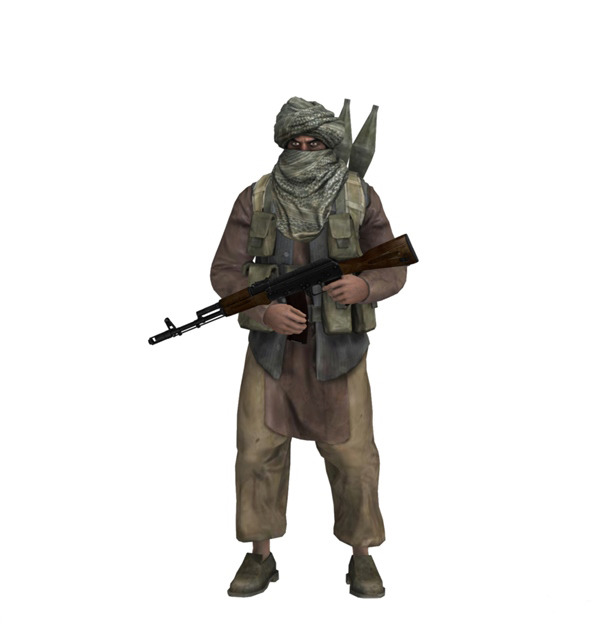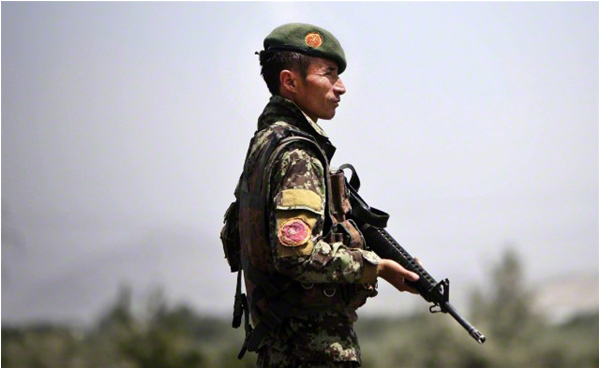
Over the past decade and a half, Pakistanis have become used to hostile statements emanating from Kabul, where anti-Pakistan sentiments run high, but President Ashraf Ghani’s uncharacteristic outburst on Monday was thoughtless and divisive.
One thing, however, clear from Mr Ghani’s temper-tantrum against Pakistan was that the bonhomie between Islamabad and Kabul, which was painstakingly developed by Mr Ghani himself and Pakistani leaders, now faces a reality check.
The flare-up cannot be dismissed as a one off emotional blurt, because Mr Ghani repeated the same in a meeting with foreign envoys at his presidential palace on Tuesday. It may soon become a norm, much like during the Karzai days. Chief Executive Mr Abdullah Abdullah, who was so far quiet, has also started churning out allegations against Pakistan in what now looks like an anti-Pakistan race between the two ruling partners.

Mr Ghani’s comments that came in the backdrop of a flurry of massive terrorist attacks in Kabul and other parts of the country accused Pakistan of continuing to shelter Taliban and not delivering on the pledges about preventing the militants from orchestrating attacks from its soil.
The frustration shown by Mr Ghani in his volcanic presser was expected from a leader, whose country is facing increasing insecurity because of stepped up terrorist attacks, but he went overboard in his criticism of Pakistan.
“It is natural for the Afghan leadership to feel jittery and there are enough anti-Pakistan elements inside and outside Afghanistan who will work overtime to create misunderstandings,” Ambassador (r) Aziz Ahmed Khan says.
It’s true that Prime Minister Nawaz Sharif and Army Chief Gen Raheel Sharif had over the past few months promised to help the Afghan government reconcile with the Taliban and went to the extent of declaring Afghanistan’s enemy as Pakistan’s enemy. These public statements by Pakistani leaders were accompanied by some tough talking with the insurgents on the back-channel. It was this pressure on the Taliban that forced the militants to attend the first round of reconciliation talks in Murree on July 7. One shouldn’t forget that those within Taliban who were opposed to peace negotiations had accused their pro-talks colleagues of trying to protect their “properties” and other interests in Pakistan. This was a proof that Pakistani security agencies had exerted pressure on the Afghan militants to talk.
How the process faltered a day before the two sides were to reconvene in Pakistan for a second session, where a ceasefire was on top of the agenda, holds important clues as regards to who is at work against Pakistan’s role in facilitating the peace process and the improvement in bilateral ties. Mr Ghani thankfully admitted in the same presser that the disclosure about Mullah Omar’s death was his intelligence agency’s job.
Agreed, Mullah Omar had died years ago and it was wrong on part of the Taliban and others who knew about the information but kept it secret; but at the same time, wasn’t the timing of the disclosure not equally mischievous? What did Afghan intelligence aim to achieve from the revelation? How much peace did the move bring?
The untimely disclosure not only threw the nascent peace process off-track, but also ignited a bitter succession struggle within the militant group. One of the explanations for the latest attacks in Afghanistan is that the different contenders for the Taliban leadership are asserting their credentials through these attacks.

“With the Taliban in a leadership struggle, the security situation is likely to deteriorate before it improves. The IS is a new factor which will try to fish in troubled waters so as to get a foothold for a base in Afghanistan,” Amb Khan explains.
One should not also forget that the information regarding Taliban’s willingness to negotiate, which was confidentially shared by Army Chief Gen Raheel Sharif with Mr Ghani in February, was also prematurely leaked to the media because of which the process got delayed by months.
Therefore, Pakistan Army’s repeated warnings about ‘detractors and spoilers’ in the process are not completely off the mark.
Mr Ghani’s complaint that Pakistan has not been cooperating against terrorism is also a bit surprising.
He should be better asked about what happened to the accord between ISI and NDS, under which the two countries were to cooperate against terrorism. A storm was unleashed in Kabul after the signing of the agreement, which now rests in limbo.
The elements opposed to the bilateral intelligence sharing and counter-terrorism cooperation were so strong and well entrenched in Afghan establishment that they then began threatening Mr Ghani’s continuation in office.
Before staking a claim that Afghanistan’s “righteousness has been proven and everyone in the region knows we (the Afghan government) made all sincere efforts for peace”, he may also think about the role of those around him and their sincerity in pursuing peace with Pakistan.
It is also beyond comprehension how Pakistan could guarantee cessation of hostilities in Afghanistan. Pakistan could only have offered to help with peace process and increase counter-terrorism cooperation. Beyond that it takes time for such problems to be resolved. The limited capacity of Afghan security forces and rise of groups like ISIS also need to be factored in.
But, at the same time, Pakistan too has many skeletons in its closet and cannot be completely exonerated.
The Afghans have a point when they raise the issue of continued presence of Taliban leadership in Pakistan, where they move about freely. The meetings Taliban leaders held in Pakistan after the confirmation of Mullah Omar’s death gave the Afghan leadership an excuse to point fingers at Pakistan.
That was the only tangible proof Mr Ghani had to offer in his meeting with foreign envoys. He said that Taliban during those meetings in Pakistan, after confirmation of Mullah Omar’s death, renewed the pledge to wage war against Afghanistan.
This is something that no country would allow.
These and other issues would have come up during a visit of an Afghan delegation to Pakistan planned for Thursday. The trip is believed to be for ratcheting up pressure on Pakistan with regards to presence of Taliban leaders on its soil.
It’s good that the two sides are talking as well, but the maximalist position taken by Mr Ghani ahead of the security meeting is not very helpful.
Amb Khan counsels patience and asks not to get prickly over the Ghani tirade. “Pakistan needs to be patient and increase high level interaction at political, security and intelligence levels in order to allay Afghan apprehensions,” he says. “We need to go the extra mile for President Ashraf Ghani’s sake. He means well and wants to bring peace to his country through reconciliation and accommodation and to work with Pakistan to achieve this.”
The writer is a freelance journalist based in Islamabad
Email: mamoonarubab@gmail.com
Twitter: @bokhari_mr
One thing, however, clear from Mr Ghani’s temper-tantrum against Pakistan was that the bonhomie between Islamabad and Kabul, which was painstakingly developed by Mr Ghani himself and Pakistani leaders, now faces a reality check.
The flare-up cannot be dismissed as a one off emotional blurt, because Mr Ghani repeated the same in a meeting with foreign envoys at his presidential palace on Tuesday. It may soon become a norm, much like during the Karzai days. Chief Executive Mr Abdullah Abdullah, who was so far quiet, has also started churning out allegations against Pakistan in what now looks like an anti-Pakistan race between the two ruling partners.

Mr Ghani’s comments that came in the backdrop of a flurry of massive terrorist attacks in Kabul and other parts of the country accused Pakistan of continuing to shelter Taliban and not delivering on the pledges about preventing the militants from orchestrating attacks from its soil.
The frustration shown by Mr Ghani in his volcanic presser was expected from a leader, whose country is facing increasing insecurity because of stepped up terrorist attacks, but he went overboard in his criticism of Pakistan.
“It is natural for the Afghan leadership to feel jittery and there are enough anti-Pakistan elements inside and outside Afghanistan who will work overtime to create misunderstandings,” Ambassador (r) Aziz Ahmed Khan says.
It’s true that Prime Minister Nawaz Sharif and Army Chief Gen Raheel Sharif had over the past few months promised to help the Afghan government reconcile with the Taliban and went to the extent of declaring Afghanistan’s enemy as Pakistan’s enemy. These public statements by Pakistani leaders were accompanied by some tough talking with the insurgents on the back-channel. It was this pressure on the Taliban that forced the militants to attend the first round of reconciliation talks in Murree on July 7. One shouldn’t forget that those within Taliban who were opposed to peace negotiations had accused their pro-talks colleagues of trying to protect their “properties” and other interests in Pakistan. This was a proof that Pakistani security agencies had exerted pressure on the Afghan militants to talk.
"We need to go the extra mile for President Ashraf Ghani's sake"
How the process faltered a day before the two sides were to reconvene in Pakistan for a second session, where a ceasefire was on top of the agenda, holds important clues as regards to who is at work against Pakistan’s role in facilitating the peace process and the improvement in bilateral ties. Mr Ghani thankfully admitted in the same presser that the disclosure about Mullah Omar’s death was his intelligence agency’s job.
Agreed, Mullah Omar had died years ago and it was wrong on part of the Taliban and others who knew about the information but kept it secret; but at the same time, wasn’t the timing of the disclosure not equally mischievous? What did Afghan intelligence aim to achieve from the revelation? How much peace did the move bring?
The untimely disclosure not only threw the nascent peace process off-track, but also ignited a bitter succession struggle within the militant group. One of the explanations for the latest attacks in Afghanistan is that the different contenders for the Taliban leadership are asserting their credentials through these attacks.

“With the Taliban in a leadership struggle, the security situation is likely to deteriorate before it improves. The IS is a new factor which will try to fish in troubled waters so as to get a foothold for a base in Afghanistan,” Amb Khan explains.
One should not also forget that the information regarding Taliban’s willingness to negotiate, which was confidentially shared by Army Chief Gen Raheel Sharif with Mr Ghani in February, was also prematurely leaked to the media because of which the process got delayed by months.
Therefore, Pakistan Army’s repeated warnings about ‘detractors and spoilers’ in the process are not completely off the mark.
Mr Ghani’s complaint that Pakistan has not been cooperating against terrorism is also a bit surprising.
He should be better asked about what happened to the accord between ISI and NDS, under which the two countries were to cooperate against terrorism. A storm was unleashed in Kabul after the signing of the agreement, which now rests in limbo.
The elements opposed to the bilateral intelligence sharing and counter-terrorism cooperation were so strong and well entrenched in Afghan establishment that they then began threatening Mr Ghani’s continuation in office.
Pakistan Army's warnings about 'detractors and spoilers' are not off
the mark
Before staking a claim that Afghanistan’s “righteousness has been proven and everyone in the region knows we (the Afghan government) made all sincere efforts for peace”, he may also think about the role of those around him and their sincerity in pursuing peace with Pakistan.
It is also beyond comprehension how Pakistan could guarantee cessation of hostilities in Afghanistan. Pakistan could only have offered to help with peace process and increase counter-terrorism cooperation. Beyond that it takes time for such problems to be resolved. The limited capacity of Afghan security forces and rise of groups like ISIS also need to be factored in.
But, at the same time, Pakistan too has many skeletons in its closet and cannot be completely exonerated.
The Afghans have a point when they raise the issue of continued presence of Taliban leadership in Pakistan, where they move about freely. The meetings Taliban leaders held in Pakistan after the confirmation of Mullah Omar’s death gave the Afghan leadership an excuse to point fingers at Pakistan.
That was the only tangible proof Mr Ghani had to offer in his meeting with foreign envoys. He said that Taliban during those meetings in Pakistan, after confirmation of Mullah Omar’s death, renewed the pledge to wage war against Afghanistan.
This is something that no country would allow.
These and other issues would have come up during a visit of an Afghan delegation to Pakistan planned for Thursday. The trip is believed to be for ratcheting up pressure on Pakistan with regards to presence of Taliban leaders on its soil.
It’s good that the two sides are talking as well, but the maximalist position taken by Mr Ghani ahead of the security meeting is not very helpful.
Amb Khan counsels patience and asks not to get prickly over the Ghani tirade. “Pakistan needs to be patient and increase high level interaction at political, security and intelligence levels in order to allay Afghan apprehensions,” he says. “We need to go the extra mile for President Ashraf Ghani’s sake. He means well and wants to bring peace to his country through reconciliation and accommodation and to work with Pakistan to achieve this.”
The writer is a freelance journalist based in Islamabad
Email: mamoonarubab@gmail.com
Twitter: @bokhari_mr

